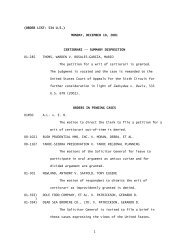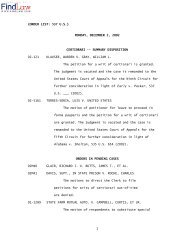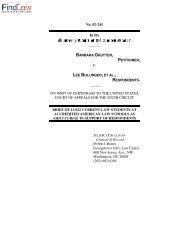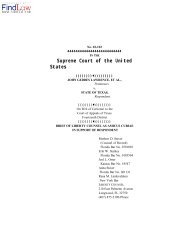No. 01-1757 Stogner v. California - FindLaw: Supreme Court Center
No. 01-1757 Stogner v. California - FindLaw: Supreme Court Center
No. 01-1757 Stogner v. California - FindLaw: Supreme Court Center
You also want an ePaper? Increase the reach of your titles
YUMPU automatically turns print PDFs into web optimized ePapers that Google loves.
34<br />
719-20 (1997). Protected are those fundamental rights that<br />
are “objectively, deeply rooted in this Nation’s history and<br />
tradition, and implicit in the concept of ordered liberty,<br />
such that neither liberty nor justice would exist if they<br />
were sacrificed.” Glucksberg, 521 U.S. at 720-21 (citations<br />
and quotation marks omitted).<br />
The <strong>Court</strong> has “always been reluctant to expand the<br />
concept of substantive due process.” Collins v. Harker<br />
Heights, 503 U.S. 115, 125 (1992); Albright v. Oliver, 510<br />
U.S. at 271-72 (observing that defendant’s claim of a<br />
substantive due process right to be free of prosecution<br />
without probable cause was “markedly different” from<br />
those matters – relating to marriage, family, procreation,<br />
and the right to bodily integrity – that, for the most part,<br />
have been accorded this protection). By extending constitutional<br />
protection to an asserted right or liberty interest,<br />
the <strong>Court</strong>, to a great extent, places the matter outside the<br />
arena of public debate and legislative action. Washington<br />
v. Glucksberg, 521 U.S. at 720. It appears, however, that<br />
petitioner would have this <strong>Court</strong> do just that, and find<br />
that a criminal defendant has a new fundamental right,<br />
protected by the Due Process Clause, in retaining the<br />
benefit of an expired statute of limitations against subsequent<br />
attempts to amend the time during which criminal<br />
charges may be filed. The <strong>Court</strong> should decline that<br />
suggestion.<br />
1. The Expiration of a Statute of Limitations<br />
Confers <strong>No</strong> Fundamental Right<br />
or Liberty Interest<br />
In Chase Securities Corporation v. Donaldson, this<br />
<strong>Court</strong> held that the shelter of a statute of limitations,<br />
“which represent[s] a public policy about the privilege to






